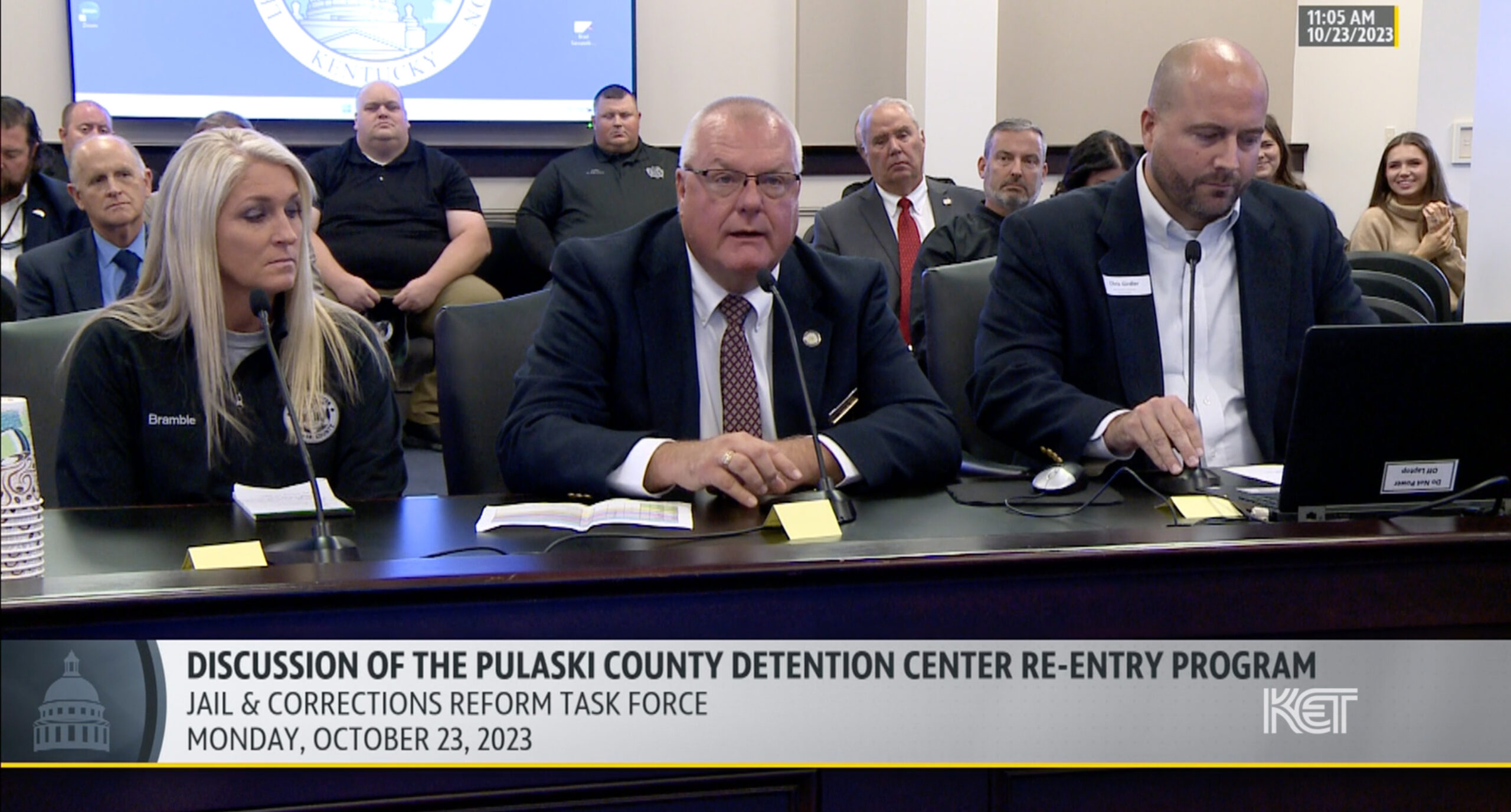Partners testify before Jail & Corrections Reform Task Force about program’s successes; program receives state media attention
Pulaski County’s inmate re-entry program has been in the spotlight during the final months of 2023, receiving attention as a model for corrections reform statewide.
Somerset-Pulaski Economic Development Authority (SPEDA) President and CEO Chris Girdler, Pulaski County Jailer Anthony McCollum and Pulaski County Detention Center Program Coordinator Michelle Bramble were invited to testify before the Kentucky General Assembly Jail & Corrections Reform Task Force in Frankfort in late October, where they shared the program’s success and answered questions from legislators interested in adopting this model across Kentucky. The re-entry program was also recently featured on WTVQ Channel 36’s Good Afternoon Kentucky broadcast.
The initiative — Comprehensive Rehabilitation of Inmates Transforming Individuals, Community and Livelihoods, or CRITICAL — offers soft skills and technical training to qualifying inmates at the Pulaski County Detention Center, allowing them to complete certifications, gain employment and earn money before being released from jail. CRITICAL also helps inmates secure important documents they often find themselves without when being released, like birth certificates, identification and Social Security cards.
Because Pulaski County Detention Center was one of the most overcrowded jails in the state when McCollum was elected jailer and building a new facility would come at too high of a cost to taxpayers, McCollum said he knew he needed to take a different approach. Partnering with SPEDA, Somerset Community College, Goodwill Industries and several other workforce development organizations, the Pulaski County Detention Center created CRITICAL to help reduce recidivism rates and ensure inmates nearing the end of their sentences have the resources they need to be successful.
“What we’d been doing in the past, you know, we’d been doing some counseling while they were in the jail and giving them resources,” McCollum testified. “When you get out of the facility, you gave them a help packet and of course we all know as soon as they went outside they threw that packet in the trash, and then a few days later here they would come back in. So we said we’ve got to start thinking outside of the box and come up with a program or come up with something that would be able to sustain them once they got outside.”
McCollum told task force members that since the program launched in 2019, 40 inmates have qualified to participate (inmates must be within 90 days of completing their sentences and have been convicted of low-level offenses) and 12 have graduated with welding certificates. Of those 12, only two have been re-incarcerated. The others have successfully re-entered society, having secured employment and made money that helped them pay off debts and secure housing and transportation.
Legislators took particular interest in how program partners have identified businesses that will employ these inmates, and how they’ve funded the effort so far.
McCollum and Girdler praised local manufacturer Hendrickson International, a global leader for designing and manufacturing air suspension systems and components for heavy-duty trucks and trailers, for being a “guinea pig” for this project and being willing to take on inmates as employees before they had been released. Girdler said other companies are now expressing interest after seeing the success Hendrickson has had in giving these inmates a second chance.
McCollum also explained that the program currently receives no state funding, instead operating on scholarships SCC works to provide inmates and donations from other organizations to purchase equipment.
“So everybody is kind of chipping in and tapping into their own resources,” McCollum said. “That’s how we were able to put this together and to do it.”
Rep. Josh Bray, who serves as committee chair, thanked Girdler, McCollum and Bramble for sharing the success they’ve had with this innovative program.
“I’ve spoken with jailers across the state, and I’ve spoken with judges across the state and one of the things I’ve learned is that no two jails are the same and no two county needs are the same, either,” Bray said. “What we have to decide at some point is, are we going to continue with the warehouse model, or are we going to start implementing rehabilitation programming similar to what you’ve done?
“I really do appreciate the job that you all done,” Bray continued. “And I really believe that the program that you all have instituted has the potential to be implemented statewide.”
Girdler thanked Bray for giving Somerset-Pulaski County a seat at the table to share the ways the community is working together to improve the quality of life of residents of all walks of life.
“We firmly believe at SPEDA that economic development is anything that one does to benefit their citizens economically, politically and socially,” Girdler said. “And so it was only fitting that we work on trying to help those who are incarcerated, who are down on their luck and looking for a second chance and yes, sometimes a third or fourth chance, to improve their lives. This is also something we knew could have a major impact on workforce development, as well as save taxpayers money long-term by cutting recidivism rates and helping the next generation not to follow in the footsteps of their predecessors. We are incredibly proud of this program and grateful to Representative Bray and the entire task force for allowing us to share this initiative. We hope it will soon be helping give second chances across Kentucky.”

